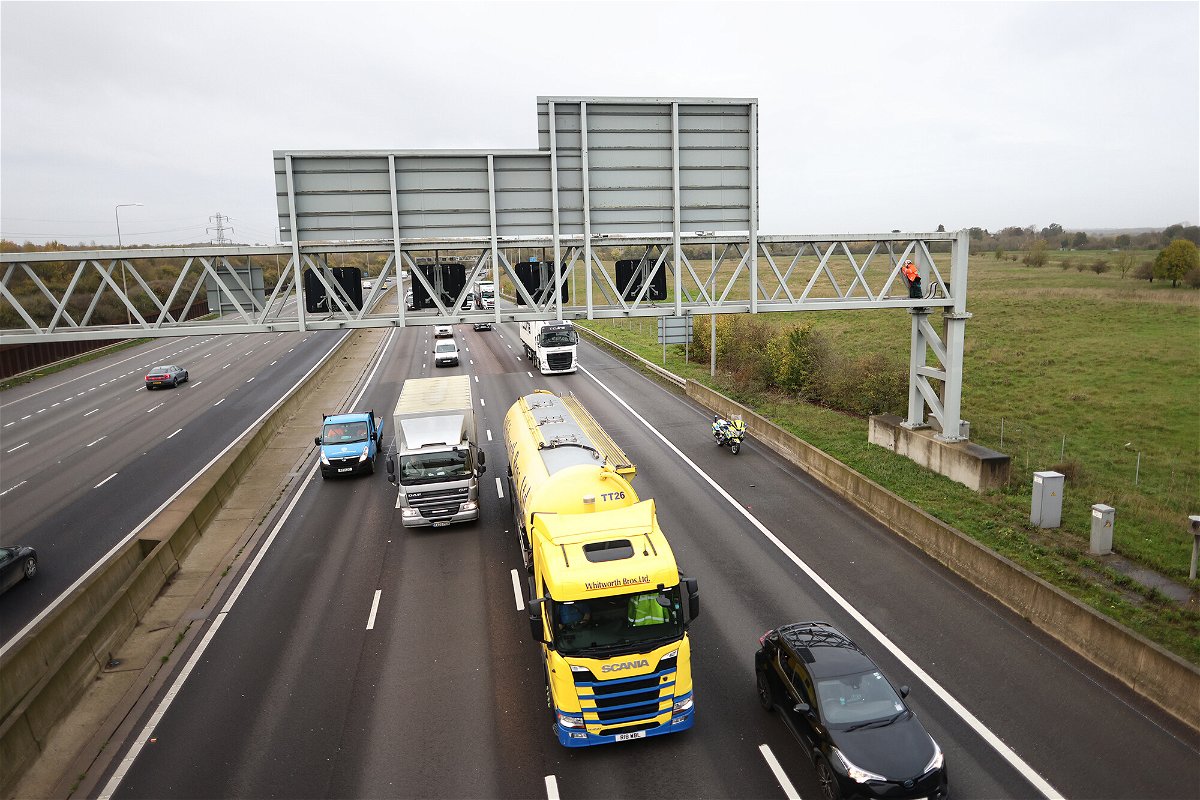UK police ‘got it wrong’ by arresting journalists covering climate protests

Activists from Just Stop Oil are pictured here climbing a gantry on the M25 highway near London Colney in Hertfordshire.
By Anna Cooban, CNN Business
UK police arrested and detained three journalists covering a climate protest earlier this week, raising concerns that the country’s press freedoms are under threat.
Police officers in Hertfordshire, a county in southern England, arrested LBC radio reporter Charlotte Lynch on Tuesday on a bridge over a public highway near London as she covered nearby protests by climate group Just Stop Oil.
In an interview with LBC on Thursday, Hertfordshire Police and Crime Commissioner David Lloyd admitted that police “got it wrong” for arresting Lynch, adding that arresting journalists “doesn’t sound right.”
In a series of Twitter posts, Lynch said that, despite showing police her press credentials, they handcuffed her “almost immediately.” Police confiscated her phone and searched her twice before holding her in a cell for five hours without questioning, she said.
“It was absolutely terrifying being in a cell with a pad for a bed in one corner and a metal toilet in the other. I was just doing my job,” Lynch said. “What’s also terrifying is what this means for press freedom. It was blindingly obvious I was a reporter,” she added.
Lynch told LBC on Wednesday that police arrested her on suspicion of “conspiracy to commit a public nuisance.” She was eventually released with no further action.
The incident came just a day after documentary filmmaker Rich Felgate and photographer Tom Bowles, also covering Just Stop Oil protests, were arrested by Hertfordshire police on a bridge.
Protestors began climbing onto gantries above London’s outer highway on Monday to demand the government halt all new oil and gas projects, leading to multiple arrests of activists.
Bowles said in a Thursday interview with TalkTV that he and Felgate were also arrested on suspicion of “conspiracy to cause public nuisance.” Hertfordshire police told CNN Business on Thursday that both Bowles and Felgate were released with no further action.
Felgate, who posted a video of his arrest on Twitter, said he and Bowles were detained for 13 hours, despite offering to show his press card identifying him as a member of the media. The cards are recognized by the National Police Chief’s Council.
“I’m quite obviously a member of the press, I’ve got cameras and I am in a public place,” Felgate can be heard saying in the video.
Police questioned both men while in custody, and asked Felgate for the code to access his phone, he told LBC in an interview on Tuesday.
Bowles said in a Tuesday tweet that three police officers arrived at his house at 11 p.m. on Monday, waking up his wife and daughter, and searched his home. He told TalkTV that he was taking legal action against the police.
Hertfordshire Police said in a statement Wednesday that its priority was to “ensure public safety as well as the safety of officers and protesters,” adding that its officers were faced with “very challenging circumstances” in trying to clear protesters from roads.
However, the police said that it “recognizes the concerns over the recent arrests of journalists” and that “additional measures are now in place to ensure that legitimate media are able to do their job.”
Those measures include the requirement that officers get approval from a supervisor to arrest anyone claiming they are a journalist, the police said.
The police force has set up an independent inquiry into the incident.
Doing their job
The arrests have drawn condemnation from journalist unions, human rights groups and politicians, concerned that they represent a serious encroachment on press freedoms.
“No reporter or other bona-fide news gatherer should fear being placed in a cell for doing their job,” Michelle Stanistreet, general secretary of the National Union of Journalists, said in a statement.
Jun Pang, policy and campaigns officer for Liberty, a UK human rights group, told CNN Business that the police action had impinged on “basic rights and press freedoms.”
“We all want to live in a country where the press is free to report on stories in the public interest,” Pang said.
A spokesperson for Prime Minister Rishi Sunak also said Wednesday that Sunak “strongly believes in championing the press.”
“[Sunak] said journalists should be able to go about their day-to-day business and hold people to account,” the spokesperson added.
The concerns add to fears that new policing laws will restrict Britons’ right to protest more generally.
The Public Order Bill, which UK members of parliament voted through last month, would make it easier for police officers to stop and search protesters and ban demonstrations expected to cause serious disruption to the public.
The bill still needs to pass through the upper house of parliament before it can become law.
— Eve Brennan and Xiaofei Xu contributed reporting.
The-CNN-Wire
™ & © 2022 Cable News Network, Inc., a Warner Bros. Discovery Company. All rights reserved.